Ranking News
-

817. Parson's Pleasure by Roald Dahl (Learn English with a Short Story)
- 관리자 기자
- 2025-06-11 11:24
-

Learn English in 30 Minutes - ALL the English Basics You Need
- 관리자 기자
- 2025-06-11 11:20
-
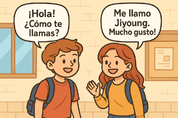
스페인어 기초 회화 1
【오늘의 대화 | Today's Dialogue】 A: ¡Hola! ¿Cómo te llamas?(Hola! ¿Cómo te llamas?)안녕하세요! 이름이 뭐예요? B: ¡Hola! Me llamo Minsu. ¿Y tú?(Hola! Me llamo Minsu. ¿Y tú?)안녕하세요! 저는 민수예요. 당신은요? A: Me llamo Jiyoung. ¡Mucho gusto!(Me llamo Jiyoung. ¡Mucho gusto!)저는 지영이에요. 만나서 반가워요! 【키워드 | Keywords】 단어 발음 (Pronunciation) 뜻 ¡Hola! 오라 안녕하세요! (Hello!) ¿Cómo te llamas? 꼬모 떼 야마스 이름이 뭐예요? (What’s your name?) Me llamo ~ 메 야모 ~ 제 이름은 ~입니다. (My name is ~.) ¿Y tú? 이 뚜 당신은요? (And you?) ¡Mucho gusto! 무쵸 구스토 만나서 반가워요! (Nice to meet you!) 【핵심 문구 해설 | Key Phrase B
- 관리자 기자
- 2025-06-10 00:15
-

일본어 기초 회화 2
【오늘의 대화 | Today's Dialogue】 A: お昼ご飯(ひるごはん)、もう食べましたか?(Ohiru gohan, mō tabemashita ka?)점심 벌써 먹었어요? B: まだです。いっしょに食べましょう!(Mada desu. Issho ni tabemashō!)아직 안 먹었어요. 같이 먹어요! A: いいですね。行きましょう!(Ii desu ne. Ikimashō!)좋아요! 가요! 【키워드 | Keywords】 단어 히라가나 뜻 お昼ご飯 おひるごはん 점심밥 もう もう 이미, 벌써 食べましたか たべましたか 먹었어요? まだ まだ 아직 いっしょに いっしょに 함께, 같이 食べましょう たべましょう 먹읍시다 (제안) 行きましょう いきましょう 갑시다 (제안) いいですね いいですね 좋네요 / 좋아요 【핵심 문구 해설 | Key Phrase Breakdown】 1️⃣ お昼ご飯、もう食べましたか? 점심 벌써 먹었어요? 일본에서는 식사 여부 묻는 말로 자연스러운 인사로도 자주 사용해요. 친구, 선생님,
- 관리자 기자
- 2025-06-10 00:10
-

일본어 기초 회화 1
【오늘의 대화 | Today's Dialogue】 A: こんにちは!お名前は何ですか?(Konnichiwa! Onamae wa nan desu ka?)안녕하세요! 이름이 뭐예요? B: こんにちは!私は ミンス です。あなたは?(Konnichiwa! Watashi wa Minsu desu. Anata wa?)안녕하세요! 저는 민수예요. 당신은요? A: 私は ジヨン です。はじめまして!よろしくお願いします!(Watashi wa Jiyon desu. Hajimemashite! Yoroshiku onegaishimasu!)저는 지영이에요. 처음 뵙겠습니다! 잘 부탁드려요! 【키워드 | Keywords】 단어 히라가나 뜻 こんにちは こんにちは 안녕하세요 (낮 인사) お名前 おなまえ (정중하게) 이름 何ですか なんですか 무엇입니까? 私 わたし 나, 저 あなた あなた 당신 はじめまして はじめまして 처음 뵙겠습니다 よろしくお願いします よろしくおねがいします 잘 부탁드립니다 【핵심 문구 해설 | Key Phrase Breakdown】 1
- 관리자 기자
- 2025-06-10 00:05
-
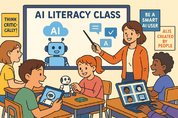
Why Learning About AI Matters: The Rise of AI Literacy Education
Why Learning About AI Matters: The Rise of AI Literacy Education Have you ever asked ChatGPT a question? Or seen your favorite app suggest songs or videos you might like? If so, you’ve already met AI — short for Artificial Intelligence. AI is becoming part of everyday life. That’s why Korean schools are starting to focus on AI literacy education — helping students understand what AI is, how it works, and how to use it wisely. What Is AI Literacy?Being “AI literate” doesn’t mean you have to become a computer scientist. It means understanding the basics of AI — like how it can recognize patterns
- 관리자 기자
- 2025-06-09 23:38
-
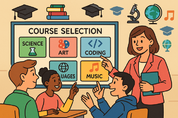
Korea’s High School Credit System: A New Path or a New Challenge?
Korea’s High School Credit System: A New Path or a New Challenge? Big changes are coming to Korean high schools. Starting in 2025, the High School Credit System — known in Korean as 고교학점제 — will be fully introduced across the country. But what does this mean for students like us? Is it an exciting opportunity, or does it bring new challenges? Let’s take a closer look. What is the High School Credit System?Until now, most high schools in Korea followed a fixed curriculum. All students in the same grade studied nearly the same subjects, regardless of their interests or future goals. The new syst
- 관리자 기자
- 2025-06-09 23:16
-

중국어 기초 회화 2
【오늘의 대화 | Today's Dialogue】 A: 你吃饭了吗?(Nǐ chī fàn le ma?)밥 먹었어요? B: 吃了。你呢?(Chī le. Nǐ ne?)네, 먹었어요. 당신은요? A: 还没呢。我们一起去吃吧!(Hái méi ne. Wǒmen yìqǐ qù chī ba!)아직이요. 우리 같이 먹으러 가요! 【키워드 | Keywords】 단어 병음 (Pinyin) 뜻 吃饭 chī fàn 밥을 먹다 了吗 le ma ~했어요? (~했는지 묻는 표현) 吃了 chī le 먹었어요 你呢 Nǐ ne 당신은요? 还没 hái méi 아직 안 했어요 一起 yìqǐ 같이 去 qù 가다 吧 ba ~하자 (제안할 때 쓰는 표현) 【핵심 문구 해설 | Key Phrase Breakdown】 1️⃣ 你吃饭了吗? 직역: 너 밥 먹었어? 자연스러운 표현: 밥 먹었어요? 중국에서 인사처럼 자주 쓰는 표현이에요. 건강, 안부를 묻는 느낌으로 많이 사용해요. 2️⃣ 吃了。你呢? 네, 먹었어요. 당신은요?
- 관리자 기자
- 2025-06-09 23:56
-
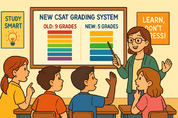
A New Grading System for Korea’s College Exam: What Will Change?
A New Grading System for Korea’s College Exam: What Will Change? Many Korean students dream of going to university, and one big step toward that dream is the Suneung, or Korean College Scholastic Ability Test (CSAT). Right now, this test uses a 9-grade system to rank students' scores. But soon, that will change. The government is planning to change the CSAT grading system from 9 grades to 5 grades. What does this mean for future test-takers — and for younger students like middle schoolers who will face this system one day? Let’s explore. What Is the Current 9-Grade System?Under the current sys
- 관리자 기자
- 2025-06-09 23:30
-
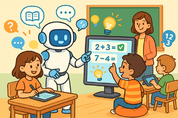
The Bright Future of AI in English and Math Education
The Bright Future of AI in English and Math Education Have you ever imagined a classroom where a friendly robot helps you write a story or solve a tricky math problem? This is no longer just science fiction — thanks to AIDT, or Artificial Intelligence Digital Textbook, the way we learn is changing faster than ever before. AIDT means using smart computer programs to improve education. In English and math, AI is already making lessons more fun, personal, and effective. Smarter English LearningAI tools can now read your writing and suggest better words or grammar. They can also help you practice
- 관리자 기자
- 2025-06-09 23:08
-
 Politics · Economy
President Lee Jae-myung Urges Stronger Measures to Combat Inflation at Economic TF Meeting
Politics · Economy
President Lee Jae-myung Urges Stronger Measures to Combat Inflation at Economic TF Meeting
-
 Life · Common sense
Sharp Rise in Illness Reports Among Young Children — Prevention Is Key!
Life · Common sense
Sharp Rise in Illness Reports Among Young Children — Prevention Is Key!
-
 IT · Science
Alibaba International Group and the Korea Cosmetic Association (KCA) are hosting the “K-Beauty Global Jump! Business & IP Strategy Conference.”
IT · Science
Alibaba International Group and the Korea Cosmetic Association (KCA) are hosting the “K-Beauty Global Jump! Business & IP Strategy Conference.”
-
 Entertainment · Broadcasting
“Your Taste” Kang Haneul x Ko Min-si, young adults who worked hard and loved passionately! The final highlight is revealed amid rising tension!
Entertainment · Broadcasting
“Your Taste” Kang Haneul x Ko Min-si, young adults who worked hard and loved passionately! The final highlight is revealed amid rising tension!
-
 Entertainment · Broadcasting
“The Seasons - Park Bo-gum's Cantabile” featuring ENFLAING, Kang Seung-won X So Su-bin, Milena, and ENHYPEN! A romantic concert that transcends generations.
Entertainment · Broadcasting
“The Seasons - Park Bo-gum's Cantabile” featuring ENFLAING, Kang Seung-won X So Su-bin, Milena, and ENHYPEN! A romantic concert that transcends generations.
-
 Culture · Events
Coloring the world, the Cheonan K-Culture Expo comes to a close... Proving itself as a representative cultural industry expo
Culture · Events
Coloring the world, the Cheonan K-Culture Expo comes to a close... Proving itself as a representative cultural industry expo
-
 Culture · Events
Ministry of Patriots and Veterans Affairs to hold 2025 UN War Veterans' Descendants Exchange Camp
Culture · Events
Ministry of Patriots and Veterans Affairs to hold 2025 UN War Veterans' Descendants Exchange Camp
-
 International
Minister Cho Tae-yeol of Foreign Affairs meets with a delegation from the Japan-Korea Economic Association
International
Minister Cho Tae-yeol of Foreign Affairs meets with a delegation from the Japan-Korea Economic Association
-
 International
Foreign Minister Cho Tae-yul meets with Secretary-General of the African Continental Free Trade Area (AfCFTA)
International
Foreign Minister Cho Tae-yul meets with Secretary-General of the African Continental Free Trade Area (AfCFTA)
-
 Medical · Health
Korea Disease Control and Prevention Agency to view domestic and overseas health hazard information in one place
Medical · Health
Korea Disease Control and Prevention Agency to view domestic and overseas health hazard information in one place
-
1
President Lee: “We will expedite the supplementary budget in order to revive the economy and stimulate consumption.”
-
2
영어 기자단 신청 - 별도 공지
-
3
First phone call between South Korean and US leaders... “Will strive to reach satisfactory agreement on tariffs”
-
4
Presidential Office announces reorganization plan: “We will create an organization that works for the people.”
-
5
Coloring the world, the Cheonan K-Culture Expo comes to a close... Proving itself as a representative cultural industry expo
-
6
No.1 Reporter
-
7
4. The Pen Is Mightier Than the Sword
-
8
3. "Don’t Put Off Until Tomorrow What You Can Do Today"
-
9
1.Tell Me and I Forget. Teach Me and I Remember. Involve Me and I Learn.
-
10
The Power of Change: Why Electric Vehicles Are the Future
-
2025-06-12 15:00
Mind Mapping: How It Can Be Used in Reading Work
-
2025-06-12 14:47
How to Learn Better If I Am an Auditory Learner
-
2025-06-12 14:36
10 Tips to Practice for Better Scores in English
-
2025-06-12 14:26
10 Tips to Practice for Better Scores in English
-
2025-06-12 14:20
Speed Reading: Is It Effective, and Can We Train for It?





















